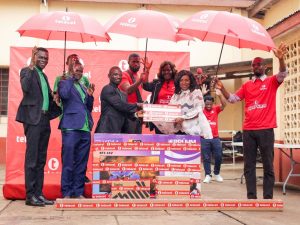
During an event celebrating International Week of the Deaf in Accra, Mercy Dawn Akude, Telecel Ghana's General Manager of Commercial Operations, has called for a national policy that would integrate sign language into the country's communication system for sharing all public information.
At a commemorative gathering aligned with the global theme "No Human Rights Without Sign Language," Mercy Dawn Akude stated that sign language is crucial for the identity, dignity, and respect of the Deaf Community. "When public information is provided without sign language interpretation, it sends an implied message that certain citizens are less worthy of that information or knowledge. Communication should serve as a bridge, not a barrier," she emphasized.
Telecel Ghana has maintained a long-standing connection with the Deaf community for almost ten years. In 2017, the company introduced Super Care, a customer service program that hires and trains Deaf individuals and staff proficient in sign language to assist customers with hearing difficulties via video call support.
Currently, thousands within the Deaf community across the country use the platform to stay connected easily, with customized data packages accessible via Telecel’s *494# service and the Telecel Play app.
In collaboration with several universities, Telecel Ghana has hired graduates from the Deaf community as part of its larger initiative to promote workplace diversity and better serve customers with specific needs. Furthermore, the Telecel Ghana Foundation regularly conducts STEM training for students at different Schools for the Deaf, highlighting the importance of making digital tools available to everyone.
Telecel Ghana celebrated this year's International Week of the Deaf by gifting a big screen television, a laptop, a projector, and a projection screen to the Ghana National Association of the Deaf (GNAD) to aid their campaigning efforts. The gift was presented by the CEO of Telecel Ghana, Ing. Patricia Obo-Nai, to the association's leaders.
The National President of the Ghana National Association of the Deaf (GNAD), Matthew Kubachua, expressed appreciation for the telecom company's initiative and continued backing, while also emphasizing the need for broader reforms. "Telecel has made a courageous move to enhance communication access and promote inclusivity in their customer service. We encourage the government and other entities to back the push for sign language to be incorporated into education, media, and public administration."
Ghana does not have thorough laws that require the use of sign language interpretation in schools, government interactions, and public media. As a result, millions of Deaf individuals in Ghana face challenges in education, job opportunities, and involvement in community affairs.
As per the 2021 Population and Housing Census, more than 211,000 Deaf and hearing-impaired individuals, along with over 470,000 people experiencing different levels of hearing impairment, reside in Ghana. Without the availability of sign language, this expanding community of Deaf individuals is excluded from accessing information, services, and a fulfilling quality of life.
Mercy Dawn Akude argued that it is natural for the country to incorporate sign language into education, public services, and media. "True human rights cannot exist without sign language, as genuine inclusion requires the acknowledgment of sign language."
We need to create a nation where sign language is not considered optional or unique, but rather fundamental and crucial. By involving the Deaf community, we are fostering a more robust, equitable, and inclusive society for everyone.
Provided by SyndiGate Media Inc. (Syndigate.info).
Posting Komentar